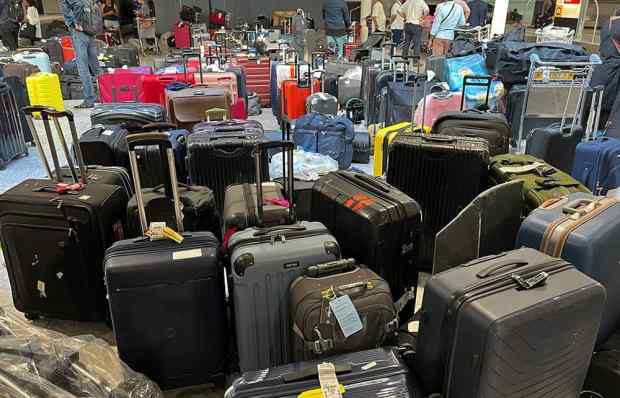The Great British Runway final between Heathrow and Gatwick is beginning to look like a game of two halves. The visit of China’s President Xi Jinping is a bonus for the west London team, who can claim that Chinese investors with bulging wallets are more likely to be impressed by landing at an urban mega-airport than an expanded flying club in Sussex. But the Volkswagen emissions scandal has been a gift for Gatwick, because as chief executive Stewart Wingate said: ‘Heathrow’s poor air quality already breaches legal limits and it’s difficult to see how expansion could legally go ahead with the millions of extra car journeys an expanded Heathrow would generate.’
Airports Commission chairman Sir Howard Davies, busy in his new job as chairman of RBS having concluded in favour of Heathrow, retorted that ‘limited weight should be placed on the suggestion that air quality represents a significant obstacle to [Heathrow’s] expansion’. But the fact he had to do so in a lengthy personal letter to Transport Secretary Patrick McLoughlin rebutting Gatwick’s criticisms of the commission’s methodology is an indication that he has found himself on the back foot.
Besides fumes, there’s a real issue about financing £5.7 billion of infrastructure work (including an M25 tunnel) around Heathrow: junior transport minister Robert Goodwill says ‘the scheme promoter’ must pay for ‘surface access’ in either case. At Gatwick, the comparable figure is £1 billion, included in the deal proposed by the airport’s owners. At Heathrow, the extra cost would have to be passed to airlines, of whom by far the biggest in terms of landing slots is IAG, the British Airways-Iberia combo — whose boss Willie Walsh says helpfully, ‘We didn’t ask for it and we’re not paying for it.’
Then there’s the politics. George Osborne and Sajid Javid, I gather, want to press on with Heathrow to prove the UK is capable of making big projects happen — and what George wants counts for plenty these days. Back in 2009, David Cameron aligned himself with Heathrow-haters by sponsoring a tree in Greenpeace’s ‘orchard of resistance’ on the runway site, but his sapling is reported to have died and he’s braced for a U-turn by the end of the year — except that he doesn’t want to perform that pirouette only to find Heathrow’s plan is undeliverable. Nor does he want to torpedo the Tories’ anti-Heathrow candidate for London mayor, Zac Goldsmith, currently polling neck and neck with Labour’s Sadiq Khan.
‘We need a futile gesture at this stage,’ Peter Cook said in a Beyond the Fringe sketch. ‘It will raise the whole tone of the war.’ Lord Adonis’s new National Infrastructure Commission is itself a tone-raiser, and I wonder if its first gesture might be to take a fresh look at the Heathrow-Gatwick spat, at Downing Street’s request, with a view to reporting back after the mayoral election in May. I still think Gatwick’s in with a shout.
Grovelling to Mr Xi
The least sinister thing about the Chinese is their money. There are many reasons to feel queasy about polishing the palace silverware for President Xi in the hope of becoming ‘China’s best partner in the West’: dumping of cheap steel at a cost of thousands of British jobs is just the latest of them. We might also — pointlessly, since it won’t make them desist — recite their delinquency in matters of cyber-theft, counterfeiting, environmental damage, denial of human rights, casualness with contracts, aggression in the South China Sea and dubious dealings with Iran and North Korea.
But a fat cheque from China Investment Corporation (which already holds stakes in Heathrow, Thames Water and Canary Wharf), or even from China National Nuclear Corporation for Hinkley Point power station, does not carry a ‘backdoor’ listening device. It pumps capital into our economy without conferring any more influence, or purloining any more know-how, than the many Qatari and other Gulf investments in London have done.
Will British exporters ever make handsome profits in China? Somehow I doubt it. Should we be grovellingly obsequious to Chinese institutional investors over here? You bet we should, and the Heathrow runway crew would be well advised to corner Xi Jinping in the VIP departure lounge.
Le French-bashing
Motoring towards the Dordogne, I tune to the France Inter radio station. There’s a lively discussion about whether France is a welcoming place for les start-ups: it was recorded at Numa, a workspace for digital ventures in Le Sentier, the former garment district of Paris now optimistically dubbed ‘Silicon Sentier’, and it’s a glimpse of how far behind France has fallen in the new economic race — ranking 15th among EU nations on Brussels’ ‘digital scoreboard’ and boasting 4,000 internet-based start-ups in the Paris region compared to at least ten times that number in London.
The problem is cultural, and even linguistic: le start-up is an ugly anglicisme but the equivalent jeune pousse (young shoot) hasn’t really caught on, and the conversation is all about how ‘cool’ it is to be ‘co-working’ with kindred spirits and making three–minute pitches to investors (‘comme speed-dating’) even if there is a ‘manque de business angels’. The French for ‘to pitch’ turns out to be pitcher.
Before and after, there’s news of trouble at Air France over job cuts; of agitation by the CGT, France’s equivalent of the TUC, which has called for a 32-hour working week; and of a strike by lawyers. Meanwhile, French GDP is expected to grow this year by just 1.1 per cent, behind the eurozone average of 1.6 per cent and the IMF’s figure for the UK of 2.5 per cent. France Inter’s reporter also makes mention of ‘le French-bashing’, which I suppose is what this is. So let me say also that France in autumn sunshine is a fine country with a lovely language to listen to while driving; but it has lost the vocabulary of enterprise.
Got something to add? Join the discussion and comment below.
Get 10 issues for just $10
Subscribe to The Spectator Australia today for the next 10 magazine issues, plus full online access, for just $10.
You might disagree with half of it, but you’ll enjoy reading all of it. Try your first month for free, then just $2 a week for the remainder of your first year.















Comments
Don't miss out
Join the conversation with other Spectator Australia readers. Subscribe to leave a comment.
SUBSCRIBEAlready a subscriber? Log in